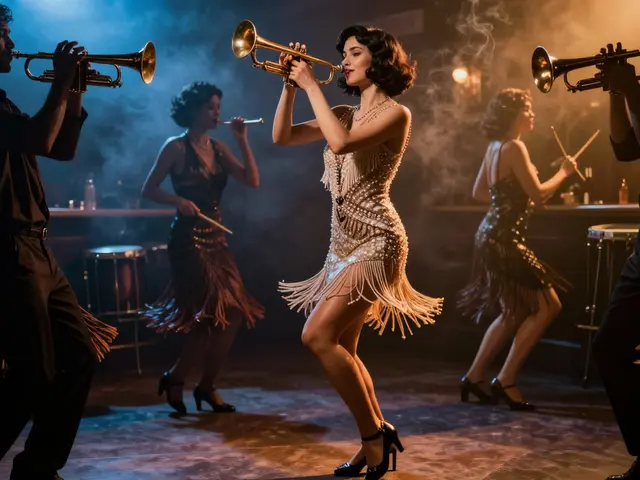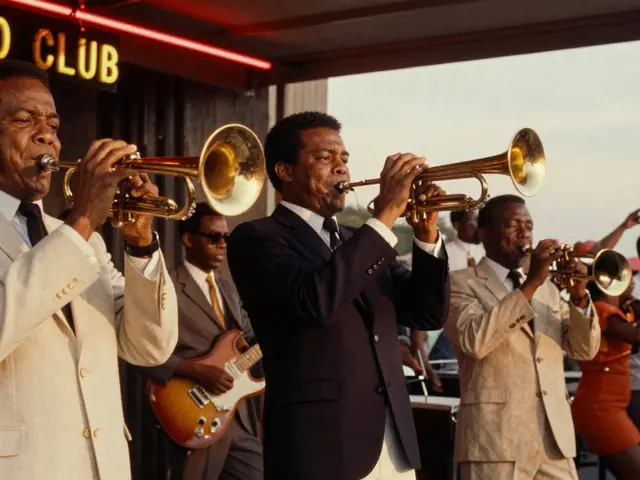Rock music has been a defining soundtrack for generations, filled with electrifying moments that have left an indelible mark on pop culture.
From legendary performances and groundbreaking albums to pioneering bands and memorable festivals, the genre is rich with history that continues to inspire.
Each of these moments offers a glimpse into the creative spirit and innovation that make rock music unforgettable.
Legendary Performances
When it comes to rock music, a few unforgettable performances stand out in history. One such moment is Jimi Hendrix’s rendition of the American national anthem at Woodstock in 1969. This performance didn’t just showcase Hendrix’s incredible guitar skills, it also encapsulated the rebellious spirit of the era. The screeching riffs of Hendrix's guitar painted a picture of the tumultuous society of the time, making it a truly iconic moment in rock history.
Another unforgettable rock milestone is Queen's performance at Live Aid in 1985. Held at Wembley Stadium and broadcast to millions of people worldwide, Freddie Mercury’s dynamism on stage was nothing short of electric. Many consider Queen's twenty-minute set the greatest live performance in the history of rock, capturing the essence of the band's music and the charisma of its frontman. The crowd's reaction was so overwhelming that it could make even the least engaged viewer feel a part of that historic moment.
The Beatles' appearance on The Ed Sullivan Show on February 9, 1964, remains another defining rock event. When they took the stage, they captivated 73 million viewers, a record-breaking number at the time. Their performance injected rock music with a renewed vibrancy and energy. It marked the beginning of the British Invasion and made The Beatles cultural icons, sparking Beatlemania across America and the world.
Not to be outdone, Nirvana’s MTV Unplugged in New York, recorded in 1993, is another that stands out. Kurt Cobain’s haunting vocals and the band's stripped-down renditions of their songs introduced a raw and intimate side of grunge music that had previously gone unseen. The performance became even more poignant after Cobain's tragic death, cementing it as a significant moment in the annals of rock history.
Bob Dylan Goes Electric
An equally monumental performance was Bob Dylan's at the Newport Folk Festival in 1965. When Dylan traded his acoustic guitar for an electric one, the audience was floored. This event marked a seismic shift in rock history, blending traditional folk music with rock's electric intensity. Many purists were outraged, but Dylan's bold move pushed the boundaries of what rock could be, creating a new realm of artistic possibilities.
Lastly, let’s not forget The Rolling Stones and their 1969 concert at Altamont Speedway. While the event is often remembered for its tragic violence, it also encapsulated the volatile spirit of rock music at the time. Mick Jagger's presence and the band's riveting performance were unforgettable, emphasizing both the power and peril that rock could represent.
These moments, among others, serve as milestones in rock music history. They highlight the genre’s emotional depth and cultural significance, offering fans timeless memories that continue to inspire new generations. Rock music is more than just a genre; it's a movement defined by its legendary performances.
Groundbreaking Albums
Few things have propelled rock music forward as much as revolutionary albums. These are the records that broke from convention, introduced new sounds, and became touchstones in music history. One such album is "Sgt. Pepper's Lonely Hearts Club Band" by The Beatles, released in 1967. This album set a new standard for what rock music could be, blending genres, incorporating orchestral arrangements, and testing the limits of studio technology. It was not just an album; it was a statement of creativity that revolutionized rock music.
Another game-changing record is Pink Floyd's "The Dark Side of the Moon." Released in 1973, this album became iconic for its elaborate production and thematic coherence. It explored profound themes such as mental illness, the passage of time, and human conflict, all set against a psychedelic rock background. With over 45 million copies sold worldwide, it remains one of the best-selling albums of all time.
"The Dark Side of the Moon turned out to be an album that resonated with an enormous number of people. It felt cohesive and offered a completely new experience in rock music." - David Gilmour
Moving into the punk rock era, The Clash's "London Calling" deserves mention. Released in 1979, this album broke the boundaries of punk by incorporating elements of reggae, rockabilly, and ska. It delivered powerful social and political messages, making it a robust declaration against the establishment. The album cover, featuring Paul Simonon smashing his bass guitar, became as iconic as the music itself.
Then there's Nirvana's "Nevermind," which changed the landscape of rock music in the early '90s. Released in 1991, it effectively brought grunge to the mainstream and ended the dominance of hair metal bands. Songs like "Smells Like Teen Spirit" became anthems for a generation, encapsulating youthful angst and disillusionment. The album's raw energy and emotion revolutionized rock for a new era.
These albums did more than top charts; they shifted paradigms. They dared to defy expectations, pushed creative boundaries, and connected deeply with audiences. By doing so, they not only became milestones in rock music history but also influenced countless artists who followed.
Pioneering Bands
In the rich tapestry of rock music history, few elements stand out as vividly as the pioneering bands that paved the way for future generations. These bands didn't just play music; they changed the cultural landscape and pushed the boundaries of what rock could be.
The Beatles are often the first band that comes to mind when discussing the origins of rock music. Emerging from Liverpool in the early 1960s, their innovative approach to songwriting and recording techniques transformed the music world. Their album, Sgt. Pepper's Lonely Hearts Club Band, is frequently cited as one of the greatest albums ever made. With songs that explored complex themes and unconventional sounds, The Beatles set the bar high for creativity in rock music. As John Lennon once said,
"We're more popular than Jesus now; I don't know which will go first, rock 'n' roll or Christianity."
Another cornerstone in rock history is Led Zeppelin, known for blending hard rock with blues influences. Formed in 1968, their heavy, guitar-driven sound laid the groundwork for what would become heavy metal. The band's live performances were legendary for their intensity and improvisation, making songs like Stairway to Heaven timeless anthems. Led Zeppelin's influence is still felt today, with many modern bands citing them as a major inspiration. Their fearless experimentation with different musical styles helped shape a genre that continues to evolve.
The Rolling Stones deserve a special mention for their longevity and consistent impact on rock music. From their early days playing blues covers in London to becoming global superstars, their journey is a testament to their adaptability and talent. The band's ability to reinvent themselves while staying true to their roots has allowed them to remain relevant across decades. Albums like Exile on Main St. and Beggars Banquet are often considered masterpieces, capturing the raw, unpolished essence of rock music.
One cannot overlook the contribution of The Ramones in pioneering the punk rock movement. Emerging from New York City in the mid-1970s, their stripped-down, fast-paced sound was a stark contrast to the more elaborate rock music of the time. With songs often shorter than two minutes, The Ramones encapsulated the rebellious spirit of punk. Their influence on bands in subsequent generations, from The Clash to Green Day, solidified their place as one of the most important bands in rock history.
The rise of Nirvana in the early 1990s marked another seismic shift in rock music. Led by the enigmatic Kurt Cobain, Nirvana's angst-ridden lyrics and raw sound spoke to a disenchanted generation. Their album Nevermind, featuring the hit single Smells Like Teen Spirit, is often credited with bringing alternative rock into the mainstream. Cobain's tragic death in 1994 only added to the band's mythos, leaving an enduring legacy that continues to influence musicians and fans alike.
These bands not only defined and redefined rock music but also left a lasting impact on popular culture. Their music and attitudes resonated with listeners, offering a sense of identity and rebellion. By understanding the contributions of these pioneering bands, one can gain a deeper appreciation of the genre's rich, multifaceted history.
Memorable Festivals
Throughout history, some rock music festivals have achieved legendary status, becoming cultural landmarks that transcend the genre. These events often drew unprecedented crowds and featured lineups that read like a who’s who of rock royalty, leaving an enduring legacy. One such event was the iconic Woodstock Festival, held in 1969.
Woodstock wasn’t just a music festival; it was a pivotal moment in rock culture, exemplifying the ideals of peace, love, and music. With an audience of over 400,000 people, the festival showcased performances by legendary artists like Jimi Hendrix, Janis Joplin, and The Who. Jimi Hendrix’s rendition of the U.S. national anthem, “The Star-Spangled Banner,” remains one of the most iconic performances in rock history. His electric guitar solo, filled with feedback and distortion, mirrored the chaos and tumult of the times, making a powerful statement about the societal upheaval of the late 1960s.
Another festival that stands out is the Monterey Pop Festival of 1967, often hailed as the precursor to Woodstock. This festival was the first major American appearance for several key rock acts, including The Jimi Hendrix Experience, The Who, and Janis Joplin. It is particularly noted for Jimi Hendrix’s guitar-smashing spectacle, where he set his guitar on fire, solidifying his reputation as a rock god. The festival also highlighted the vibrant and diverse nature of the rock scene during the Summer of Love, making it a significant cultural milestone.
Fast forward to the 21st century, Glastonbury Festival in the UK has become one of the most revered rock festivals globally. Founded in 1970, Glastonbury has evolved into a multi-genre event, but its heart remains in rock music. The festival’s Pyramid Stage has seen historic performances from the likes of David Bowie, Coldplay, and Radiohead. Bowie’s 2000 Glastonbury set is often cited as one of the greatest performances in the festival’s history. Glastonbury’s success lies in its ability to blend new talent with established legends, continuing to attract huge crowds year after year.
Meanwhile, in the southern hemisphere, Australia’s own Big Day Out festival made waves from 1992 until its final run in 2014. Known for its eclectic lineups, Big Day Out featured heavyweights like Nirvana, Pearl Jam, and the Red Hot Chili Peppers. Kurt Cobain’s performance with Nirvana during the 1992 tour is etched into the annals of rock history, capturing the raw energy and emotion that defined the grunge movement. The festival played a significant role in shaping the rock landscape in Australia and introduced many local acts to a larger audience.
Rock music festivals continue to be a vital part of the genre’s culture, offering a space where fans can come together and experience the music they love in a communal setting. These events have a unique ability to capture the spirit of rock and roll, blending raw energy, powerful performances, and a sense of community. As rock music evolves, the legacy of these memorable festivals serves as a reminder of the genre’s enduring impact and its ability to bring people together from all walks of life.
“Woodstock was a peak experience and one of the happiest times of my life. I mean, it really represented something.” - Richie Havens





